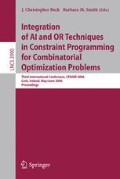Abstract
As many real-world problems involve user preferences, costs, or probabilities, constraint satisfaction has been extended to optimization by generalizing hard constraints to soft constraints. However, as techniques such as local consistency or conflict learning do not easily generalize to optimization, solving soft constraints appears more difficult than solving hard constraints. In this paper, we present an approach to solving soft constraints that exploits this disparity by re-formulating soft constraints into an optimization part (with unary objective functions), and a satisfiability part. This re-formulation is exploited by a search algorithm that enumerates subspaces with equal valuation, that is, plateaus in the search space, rather than individual elements of the space. Within the plateaus, familiar techniques for satisfiability can be exploited. Experimental results indicate that this hybrid approach is in some cases more efficient than other known methods for solving soft constraints.
Access this chapter
Tax calculation will be finalised at checkout
Purchases are for personal use only
Preview
Unable to display preview. Download preview PDF.
References
Bistarelli, S., et al.: Semiring-based CSPs and Valued CSPs: Frameworks, Properties, and Comparison. Constraints 4(3), 199–240 (1999)
Cooper, M., Schiex, T.: Arc consistency for soft constraints. Artificial Intelligence 154, 199–227 (2004)
Dechter, R., Pearl, J.: Generalized Best-First Search Strategies and the Optimality of A*. Journal of the ACM 32(3), 505–536 (1985)
Dechter, R., Pearl, J.: Tree clustering for constraint networks. Artificial Intelligence 38, 353–366 (1989)
Dechter, R.: Enhancement schemes for constraint processing: Backjumping, learning and cutset decomposition. Artificial Intelligence 41, 273–312 (1990)
Gent, I.P.: Arc consistency in SAT. In: Proc. ECAI 2002 (2002)
de Givry, S., Zytnicki, M., Heras, F., Larrosa, J.: Existential arc consistency: Getting closer to full arc consistency in weighted CSPs. In: Proc. of IJCAI 2005 (2005)
Gottlob, G., Leone, N., Scarcello, F.: A comparison of structural CSP decomposition methods. Artificial Intelligence 124(2), 243–282 (2000)
Hamscher, W., Console, L., de Kleer, J. (eds.): Readings in Model-Based Diagnosis. Morgan Kaufmann, San Francisco (1992)
Hart, P.E., Nilsson, N.J., Raphael, B.: A formal basis for the heuristic determination of minimum cost paths. IEEE Trans. Sys. Sci. Cybern. SSC–4(2), 100–107 (1968)
Iwama, K., Miyazaki, S.: SAT-variable complexity of hard combinatorial problems. IFIP World Computer Congress, 253–258 (1994)
Kask, K., et al.: Unifying Tree-Decomposition Schemes for Automated Reasoning. Technical Report, University of California, Irvine (2001)
de Kleer, J.: An Assumption based TMS. Artificial Intelligence 28(1), 127–162 (1986)
Larrosa, J., Dechter, R.: On the Dual Representation of non-binary Semiring-based CSPs. In: Proceedings SOFT-2000 (2000)
Li, H., Williams, B.C.: Generalized Conflict Learning for Hybrid Discrete/Linear Optimization. In: van Beek, P. (ed.) CP 2005. LNCS, vol. 3709, pp. 415–429. Springer, Heidelberg (2005)
Mackworth, A.: Constraint satisfaction. Encyclopedia of AI (second edition) 1, 285–293 (1992)
Moskewicz, M., Madigan, C., Zhao, Y., Zhang, L., Malik, S.: Chaff: Engineering an efficient SAT solver. In: Proc. of the Design Automation Conference (DAC) (2001)
Petit, T., Régin, J.-C., Bessière, C.: Meta-Constraints on Violations for Over-Constrained Problems. In: Proc. ICTAI-2000, pp. 358–365 (2000)
Petit, T., Régin, J.-C., Bessière, C.: Specific Filtering Algorithms for Over-Constrained Problems. In: Walsh, T. (ed.) CP 2001. LNCS, vol. 2239, pp. 451–465. Springer, Heidelberg (2001)
Sachenbacher, M., Williams, B.C.: On-demand Bound Computation for Best-First Constraint Optimization. In: Wallace, M. (ed.) CP 2004. LNCS, vol. 3258, pp. 762–766. Springer, Heidelberg (2004)
Sandholm, T.: An algorithm for optimal winner determination in combinatorial auctions. In: Proceedings IJCAI-1999 (1999)
Schiex, T., Fargier, H., Verfaillie, G.: Valued Constraint Satisfaction Problems: hard and easy problems. In: Proc. IJCAI 1995, pp. 631–637 (1995)
Terrioux, C., Jégou, P.: Bounded Backtracking for the Valued Constraint Satisfaction Problems. In: Rossi, F. (ed.) CP 2003. LNCS, vol. 2833, pp. 709–723. Springer, Heidelberg (2003)
Toolbar, http://carlit.toulouse.inra.fr/cgi-bin/awki.cgi/ToolBarIntro
Walsh, T.: SAT vs. CSP. In: Dechter, R. (ed.) CP 2000. LNCS, vol. 1894, pp. 441–456. Springer, Heidelberg (2000)
Weld, D.S., de Kleer, J. (eds.): Readings in Qualitative Reasoning about Physical Systems. Morgan Kaufmann, San Francisco (1989)
Williams, B., Ragno, R.: Conflict-directed A* and its Role in Model-based Embedded Systems. Journal of Discrete Applied Mathematics (to appear)
Xing, Z., Zhang, W.: MaxSolver: An efficient exact algorithm for (weighted) maximum satisfiability. Artificial Intelligence 164(1–2), 47–80 (2005)
Author information
Authors and Affiliations
Editor information
Editors and Affiliations
Rights and permissions
Copyright information
© 2006 Springer-Verlag Berlin Heidelberg
About this paper
Cite this paper
Sachenbacher, M., Williams, B.C. (2006). Conflict-Directed A* Search for Soft Constraints. In: Beck, J.C., Smith, B.M. (eds) Integration of AI and OR Techniques in Constraint Programming for Combinatorial Optimization Problems. CPAIOR 2006. Lecture Notes in Computer Science, vol 3990. Springer, Berlin, Heidelberg. https://doi.org/10.1007/11757375_16
Download citation
DOI: https://doi.org/10.1007/11757375_16
Publisher Name: Springer, Berlin, Heidelberg
Print ISBN: 978-3-540-34306-6
Online ISBN: 978-3-540-34307-3
eBook Packages: Computer ScienceComputer Science (R0)

